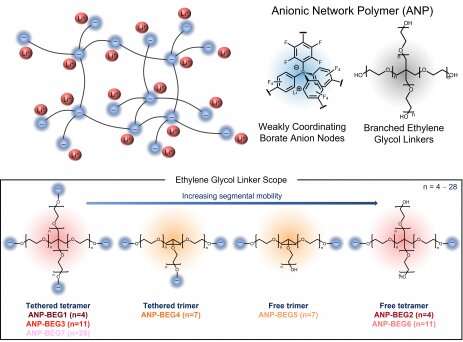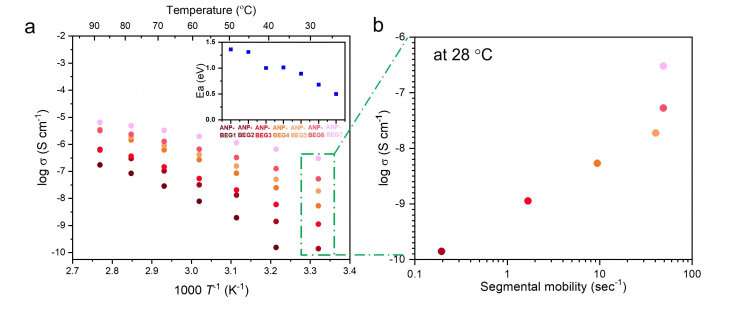Engineering team unlocks the key to new generation of safe, energy-efficient lithium batteries
Under the challenge of climate change and the demand for clean energy, there have been rising concerns about the manufacturing of batteries with a high level of safety and higher capacity, which is crucial for supporting the continuous growth of electric vehicles and grid energy storage systems.
A new generation of lithium-ion batteries developed by a team led by Dr. Dong-Myeong Shin from the Department of Mechanical Engineering at the University of Hong Kong (HKU) paves the way for a workable solution. The team has discovered a series of anionic network solid electrolytes that can form an integral part of the new battery, which is safer, higher in power density and has a longer life cycle.
The findings have been published in the Chemical Engineering Journal in an article entitled “Engineered networking in a family of solvent-free single-ion conducting borate network polymer electrolytes for Li-metal battery applications.”
Lithium-ion batteries have been the most commonly used batteries with their state-of-the-art energy storage technology. Currently, commercial battery technology mainly features liquid electrolytes and carbonaceous anodes, which has the drawbacks of safety issues, limited lifetime, and insufficient power density.
In liquid electrolytes, lithium cations and counter anions move in opposite directions to conduct electricity. Normally, anions move at least four times faster than lithium cations, and thus lithium cation transfer contributes only a small fraction (20%) of the overall ionic current, while excessive anions accumulate at the interface between electrode and electrolyte, causing internal short circuits and capacity fade of the battery.

Liquid electrolytes’ flammability, instability with respect to lithium metal, and low ion selectivity for conduction are driving research toward solid electrolytes that can provide acceptable levels of safety and are compatible with the lithium metal anode, which currently exhibits the highest theoretical specific power capacity.
The single-ion conducting polymer electrolytes designed by Dr. Shin’s team found a remarkable increase (at least 4-fold) in cationic transport. The anionic network polymers designed by the team consist of borate anions bridged by branched ethylene glycol linkers of differing stoichiometric ratios, in which the anions are tethered into the polymer frame, enabling a highly selective cation transport.
The cation conductivity within the polymer was controlled by systematic engineering of segmental mobility, helping to map out the comprehensive design rules for a new class of highly conductive solid electrolytes.
As the single-ion conducting polymer electrolytes successfully overcomes the persistent problems of current solid electrolytes in battery cells, such as low cyclability and high overpotential, a new design rule for ion-selective electrolytes is predicted to facilitate speeding up the realization of rechargeable Li-metal batteries.

“We believe the single-ion conducting polymer electrolytes would open up the possibility of new battery chemistries that will revolutionize the field of rechargeable batteries, and offer a high level of safety, high power density, and long life cycle,” said Jingyi Gao, the first author of the paper and a Ph.D. student of Dr. Shin.
The ion-selective electrolytes in batteries can also result in fast charging due to low overpotential, adds Dr. Shin. “It can allow electric vehicles to be fully charged in just the time needed for drinking a cup of coffee. This remarkable advantage will unlock a new era of a clean energy world.”
More information:
Jingyi Gao et al, Engineered networking in a family of solvent-free single-ion conducting borate network polymer electrolytes for Li-metal battery applications, Chemical Engineering Journal (2022). DOI: 10.1016/j.cej.2022.138407
Citation:
Engineering team unlocks the key to new generation of safe, energy-efficient lithium batteries (2023, March 8)
retrieved 8 March 2023
from https://techxplore.com/news/2023-03-team-key-generation-safe-energy-efficient.html
This document is subject to copyright. Apart from any fair dealing for the purpose of private study or research, no
part may be reproduced without the written permission. The content is provided for information purposes only.
For all the latest Technology News Click Here
For the latest news and updates, follow us on Google News.

